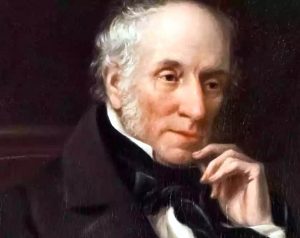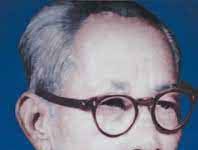William Wordsworth-Brief Biography
William Wordsworth
William Wordsworth-Brief Biography
At the fringe end of eighteenth-century England there was born a great poet who made bold defiance against the age-long poetic tradition and successfully gave rise to a new tradition of poetry both with theory and practice which is called the ‘Romantic Tradition’—the name of that great prophet-poet was William Wordsworth.
William Wordsworth was born on 7th April 1770 at Cocker mouth in Cumberland. His father John Wordsworth was an attorney at law and his mother Mrs. Anne Wordsworth was a good-natured housewife.
Wordsworth spent his childhood partly at Cockermouth and partly at Penrith with his mother’s parents. In his childhood, he was of a morose and violent temper for which his parents were anxious about his future. His parent had five children among whom Wordsworth was the second.
In 1778, while Wordsworth was eight years old, his mother died of a cold. In the same year, he was sent to a grammar school at Hawkshead. There he was boarded along with other boys in a college of Anne Tyson, an old dame of the village. His school days at Hawkshead were a happy one as he spent his leisure hours reading whatever books he liked.
In 1783, while Wordsworth was fourteen years old, his father died leaving the children under the guardianship of their uncle. In 1787 Wordsworth was sent to St. John’s College, Cambridge. His college career was not so good as he disliked the college curriculum and college discipline. Instead of that, he liked to read widely in the literature. In 1790 he paid a visit to France and in 1791 he took his B.A. degree somehow.
Next in November 1791 William Wordsworth went to France and visited Paris, the Legislative Assembly, and the ruins of the Bastille. He passed through revolutionized Paris with satisfaction and sympathy. Then he went to Orleans and then to Blois. In Orleans, he came in contact with the revolutionary army officers and notably with Beaupuy, an enlightened republican in politics. This visit to France gave rise to his mind idea of freedom under natural law which had been latent in Wordsworth since his childhood. At Blois, Wordsworth met a France girl by the name of Annette Vallow with whom he fell in love. He did not marry her but developed a carnal relationship with her and as a result, an illegitimate daughter was born to them.
In 1792 William Wordsworth returned from France to his native land. The next few years of his life were full of unhappy wanderings. In 1793, he published his poetical works, An Evening Walk and Description Sketches, but they were poorly received by the reader community. During this time, he met Godwin and talked with him and learned from him the lesson on the Ascendency of Reason over Feeling.
In 1795 William Wordsworth settled with his sister Dorothy at Racedown in Dorsetshire and wrote out some poems such as, ‘Guilt and sorrow’, ‘The Borderers’, ‘Ruined Cottage’, and a few others. In the same year, he met Coleridge and made a life-long friendship. Coleridge had admired his poetry before their meeting. The meeting between them was a chemical mixture of gold and diamond.
In 1797 William Wordsworth and his sister Dorothy moved to Alfoxden where Coleridge lived along with his wife. There they began to live in the happiest intimacy. Wordsworth and Coleridge became hand-and-glove friends. Under their mutual understanding, a book of poetry appeared in 1798 under the title, The Lyrical Ballads which was to be a landmark in the history of the Romantic Movement in Literature. First, this volume of poetry was poorly received by the readers and critics, but in 1799 its second edition appeared with a long and detailed preface in which Wordsworth laid down his new poetic theory.
In 1798 William Wordsworth visited Germany with a view to learning German. But he was disappointed in learning German. In 1799 he returned to England and settled at Dove Cottage, Grasmere. After returning to England Wordsworth married Marry Hutchinson. They reproduced five children, two of whom died in infancy. The years of Dove Cottage were the most productive period in Wordsworth’s literary life.
In 1813 Wordsworth moved to Rydal Mount, his final home. As he was financially poor, so a friend of his by the name of George Beaumont helped him and in 1814 he was appointed a stamp Distributor for Westmoreland Country. In 1814 he visited Scotland, Switzerland, Italy, and Netherlands. But his later years became cloudy as he lost his brother John Wordsworth, sister Dorothy and his daughter Dora.
On Southey’s death in 1843, Wordsworth accepted the poet laureateship on the understanding that he would not be asked to write an official poem.
His last days seemed entirely peaceful and calm. On 23rd April 1850, he died of a sudden attack of cold and was buried in Grasmere Churchyard as he had wished. Thus the life of a great poet came to an end.
Wordsworth was a healthy man, who became bald at a later age. His temperament was cold but emotional and sometimes melancholic. He loved to live in contact with nature. Travelling was his hobby.
His writing, especially poetry is voluminous. Amongst his poetic works ‘The Lyrical Ballads’ (1798), ‘The Prelude’, ‘The Excursion’ etc. are worth mentioning. His poems deal with two themes—Nature and Man.
His Nature poems are mainly romantic. In his nature poems, he portrays Nature as a source of joy, delight, and wonder, as a teacher and then as a mystic representation of the almighty.
His poems dealing with the theme of Man is generally realistic. He for the first time brought the lower classes of people, into the domain of poetry. They read like a twentieth-century short story and they are a real representation of the poor people who live in close contact with Nature.
His method of representing the theme is subjective. He first observes Nature as it is and then he lets his imagination run on after the appeal made by the objects of Nature.
He lacks humour and wit; but is replete in pathos and melancholy. His style and language are easy and simple. Being inspired by him many poets after him practised this kind of poetry and soon this romantic tradition ran on to other branches of literature also.
Note: Prophet-poet: a poet who propounds a new poetic theory and practices it. 0 0 0
William Wordsworth
N.B. The article ‘William Wordsworth-Brief Biography’ originally belongs to the book ‘The World Writers-Brief Biographies‘ by Menonim Menonimus.
William Wordsworth
Books of Composition by M. Menonimus:
- Advertisement Writing
- Amplification Writing
- Note Making
- Paragraph Writing
- Notice Writing
- Passage Comprehension
- The Art of Poster Writing
- The Art of Letter Writing
- Report Writing
- Story Writing
- Substance Writing
- School Essays Part-I
- School Essays Part-II
- School English Grammar Part-I
- School English Grammar Part-II..
Books of S. Story by M. Menonimus:
Related Search:











